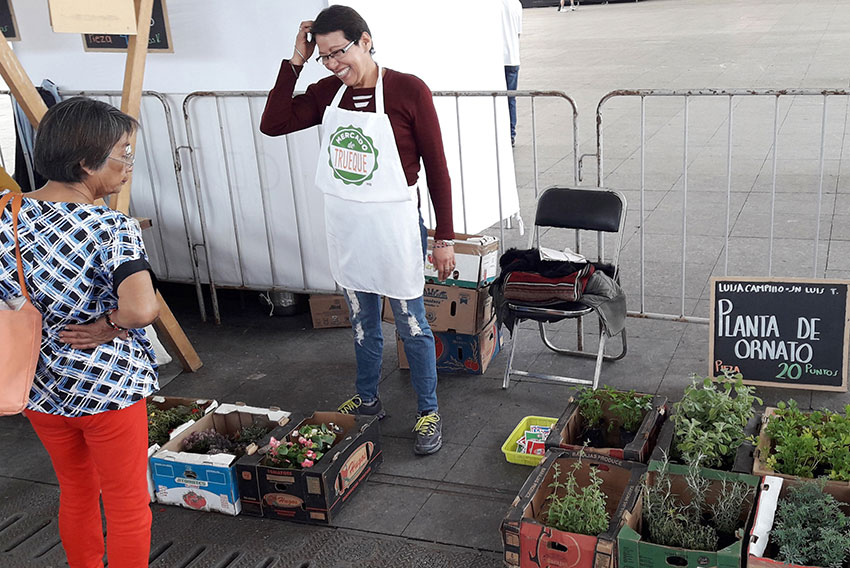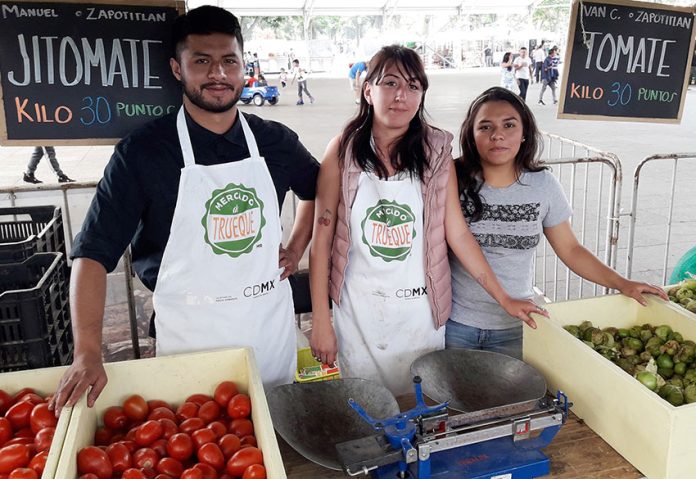On the second Sunday of every month, Mexico City residents can barter their recyclables for fresh produce grown by local farmers.
The Mercado de Trueque (exchange or barter market) began in 2012, and its location rotates around the city. The most recent took place on July 14 in Macroplaza Iztapalapa, and the next will be held on August 11 in Bosque de Chapultepec.
The recycle-for-fresh-produce market concept is uncommon, but not unique to Mexico City. The Brazilian city of Jundiaí has had a similar program for 15 years.
Upon entering the market, visitors go first to the sorting area where government employees help sort and weigh materials they have brought. Recyclers receive a printed ticket with points that can be exchanged for puntos verdes (green points) to spend in the market.
Recyclable materials include aluminum, glass bottles, metal cans, paper, cardboard and electronics. For plastics, PET (#1), HDPE (#2) and Tetra Paks are accepted. Many other plastics cannot be recycled. Consumers should look for the numbers 1 or 2 on their plastic containers. Any other numbers are not recyclable. Materials like PET that are easier to recycle are worth more points in the market.

Each person may bring up to 10 kilograms of recyclable material, and the minimum is one kilogram. Containers such as glass bottles and cans must be rinsed.
Thus far this year, over 5,000 kilos of recyclables have been collected.
Waste vegetable oil is also collected by Biodiesel Biofuels de Mexico at every market. Mexico does not create its own biodiesel, but rather collects waste vegetable oil to send to Europe to be processed for use in automobiles and machinery.
The produce in Mercado de Trueque is all locally grown, coming from the boroughs of Xochimilco, Tláhuac, Milpa Alta, Tlalpan and Magdalena Contreras. These boroughs in the south of the city still have agricultural communities.
It can be difficult for these farmers to subsist on the prices offered on the open market. Sedema buys their produce at a fair price, then exchanges it at the mercado.
Depending on the season, one can buy vegetables such as spinach, tomatoes, radishes, verdolagas (purslane), quelites (wild greens), chard, squash, pumpkin flowers, mushrooms, cactus, parsley, cilantro, lettuce and corn. There are also moles, cheeses, traditional candies and house plants.
Said a volunteer, “I volunteer here because it encourages recycling, and it gives people healthy food. It’s all food from here in the city. That’s why we don’t have much fruit, because they grow fruit in the states and more vegetables here.”
She was working in one of the puestos (kiosks), offering red and green tomatoes for 30 green points per kilo.
She hopes more people will take advantage of the market to recycle their household residuals safely and to support local farming.
“It’s a really cool initiative. It was started in the last presidential term, but it continued after the change of government. We don’t always see that.”
Clearly, Mercado de Trueque offers Mexico City residents and area farmers a win-win.
The writer lives and works in Mexico City.
